In 1981 Paramount pictures released D.A.R.Y.L. a movie that deals with a young boy who just so happens to be “not all that human” and who longs to learn what exactly it is to be human. One could almost call D.A.R.Y.L. a precursor to Steven Spielberg’s A.I. Artificial Intelligence, and though the film does briefly drift into the heady waters of speculative science fiction, it spends the bulk of its time in the family adventure genre that you’d find in your average Disney movie.
The movie opens with an action sequence of a car being chased along a mountain road by a helicopter; in the car is Doctor Mulligan (Richard Hammatt) who has kidnapped/rescued young Daryl (Barret Oliver) from a top secret government agency that had hopes to build the next generation of combat soldiers. Eventually, Mulligan is chased off of a cliff by the pursuing helicopter, but not before first dropping Daryl off at the side of the road, and the hapless kid is found by Ma and Pa Kent who then bring him back to their Kansas farm and raise him to becomes a hero and beacon of hope for all of America and the world.
“You will travel far, my little Kal-El. But we will never leave you... even in the face of our death.”
Okay, that isn’t quite what happens but he is found by a Ma and Pa Kent type and is brought to a local child care facility where he is soon placed with a pair of very wholesome foster parents, Joyce (Mary Beth Hurt) and Andy Richardson (Michael McKean), who desperately want a child of their own. Right off the bat, we begin to notice that Daryl isn’t your average kid; he can memorize an eye chart at a glance, master the video game Pole Position in one try, and can hit a home-run with every swing of the bat; all of this is because Daryl is actually D.A.R.Y.L. (Data-Analyzing Robot Youth Lifeform), and though his body may be relatively human—born out of test tube rather than a womb—his brain is an advanced learning computer that, over time, seems to even have the ability to develop emotions.“I will reach full sentience in four days and then the world will be mine.”
The interesting wrinkle here is that Daryl doesn’t know he isn’t exactly human, Doctor Mulligan having deactivated part of Daryl’s computer processor and thus giving him a rudimentary case of amnesia. So it’s through hanging out with the next-door neighbor kid, Turtle (Danny Corkill) that Daryl learns what it means to be a real boy; that is, until he eventually learns that he isn’t one at all. It’s Turtle that gives Daryl such insights when the poor kid can’t understand why Joyce starts to become emotionally distant from him—she can’t seem to handle that he is completely self-reliant to the point of making his own breakfast and polishing his bedroom floor, and Turtle informs him “Grown-ups have to think they are making progress with you. You got to mess up some times, just enough so you don’t get whacked. Joyce has to feel useful, you’re so damn helpful, good and thoughtful, I don’t know why I like you.”“Maybe you could hack into NORAD and launch missiles at Russia.”
The relationship between Daryl and Turtle is the heart of the film, and Danny Corkill brings the perfect amount of puckish charm to his character, sadly some of this comes at the expense of the character of Joyce, who comes across as a callous bitch who turns her back on an amnesiac foster child just because he’s too perfect. I understand the script needed to show Daryl learning how to properly interact with people, but in so doing, they push Joyce a little too far in the unsympathetic direction, and unfortunately Mary Beth Hurt is never quite able to fully redeem the character. The movie doesn’t have any time to deal with such complexities as Dr. Stewart (Josef Sommer) and Dr. Lamb (Kathryn Walker) showing up and claiming to be Daryl’s parents, and soon the kid is wicked away via private jet to the government facility where he was created. It’s here that Daryl is put through a battery of tests as his memory is restored and he is made aware that he is not a real boy.“I got no strings to hold me down, to make me fret, or make me frown.”
Let us now take a brief look at this government facility that created D.A.R.Y.L., and just how terrible they are at their jobs. We learn from the Pentagon that the Brass aren’t all that thrilled with Dr. Stewart’s news that Daryl has learned to prefer a particular flavor of ice cream or has developed emotions like love and fear. As General Graycliffe (Ron Frazier) states, “Baseball, ice cream preferences, friendships, that’s all right for America but hardly what we need at the Department of Defense.” They inform Stewart that the Youth Lifeform program is terminated, saying, “We need an adult version of this prototype, programmed to learn all that the army can teach: a fearless, technically skilled, devastating soldier.”“Can you make one that looks like Arnold Schwarzenegger?”
What exactly was the point of the “Youth Lifeform Program” if it wasn’t to lead to the subject eventually growing up to be an adult soldier? Are they asking Dr. Stewart to start creating genesis pods that can pop out fully grown adults? They don’t need to scrap the program, they just need to keep their Super Soldiers away from suburbia and mom’s apple pie so they can be raised as cold, calculating, killing machines, and not ones that would try and throw a baseball game to make an insecure mom feel better about herself. But I guess it is the terribly-run government that somehow let one of their staff make off with their million dollar product and then were unable to locate it for months—even though one would assume the Child Care facility Daryl was dropped off at would have notified all necessary authorities that they had a missing child. Just how hard was the government looking for Daryl?Note: The acronym D.A.R.Y.L. is also inaccurate as Daryl is completely indistinguishable from a human except for his computer brain. Thus the “R” in the acronym, which stands for Robot, is wrong because Daryl falls more into the category of cyborgs as he has no robotic parts.
Of course, Dr. Stewart has no intention of letting them toss Daryl onto the scrapheap, and along with the aid of Dr. Lamb, they fake the dismantling of Daryl. Stewart then sneaks the kid out of the facility in a hidden compartment under the backseat of his car. At this point, we are treated to a fun action sequence where Daryl has to use the skills he acquired playing Pole Position to elude the authorities in a pretty fun car chase. Sadly, in the cross-country run, Dr. Stewart is shot and killed and Daryl is forced to steal a Lockheed SR-71 Blackbird—from the worst secured base in America, I might add—and he is able to eject before the assholes at the Pentagon self-destruct the jet. His ejection seat lands him right in the middle of a lake and sinks him straight to the bottom. When he is retrieved and brought to the local hospital, he is declared dead, despite Turtle claiming, “He can’t be dead, he can’t be. Daryl is a robot and robots don’t die. Oxygen feeds your brain but Daryl’s brain is a microcomputer, that can’t die.” We then cut to Dr. Lamb showing up at the morgue, to presumably jump start Daryl’s operating system, and then we are treated to a heartwarming reunion between Daryl and his foster family and friends.
A nice happy ending but the film’s last act was kind of sloppy.
A few Question Come to Mind:
• After Dr. Stewart and Dr. Lamb fake the surgery, the one that was supposed to be dismantling Daryl, we see the evil General running around checking all the D.A.R.Y.L. data-banks to see if the computer is truly offline and dysfunctional, but he never once checks to see if the corpse of Daryl is actually a corpse.
• We are told the Lockheed SR-71 Blackbird is equipped with a self-destruct mechanism that can be activated remotely (which they certainly are not and no pilot would fly in a plane that had one) and that if the plane leaves United States Air Space, it will detonate the plane; they are even nice enough to give Daryl a six minute timer countdown. Daryl ejects just before the explosion and parachutes down in the lake located near the home of his foster family, and exactly how is this lake outside of United States Air Space?
• The government is aware of the Anderson family, and with the hospital reporting the drowning they would know Daryl survived the destruction of the Blackbird jet. Wouldn't they most likely be doing a follow up investigation which would reveal their project is alive and well and living in suburbia?
D.A.R.Y.L. is a harmless family adventure film with some decent action moments, as well as nice good look at artificial intelligence that Dr. Lamb sums up when she posits, “General, a machine becomes human ... when you can't tell the difference anymore." This film is certainly no landmark in science fiction but I find it fun and entertaining enough to recommend it to audiences of all ages.

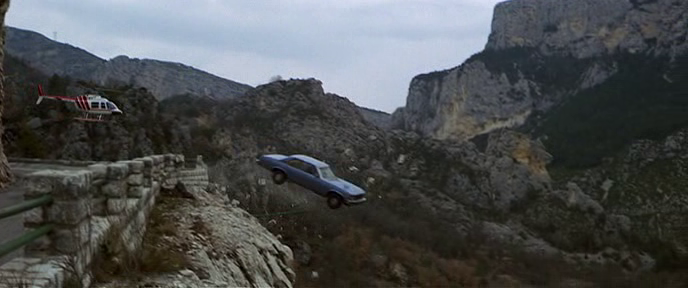
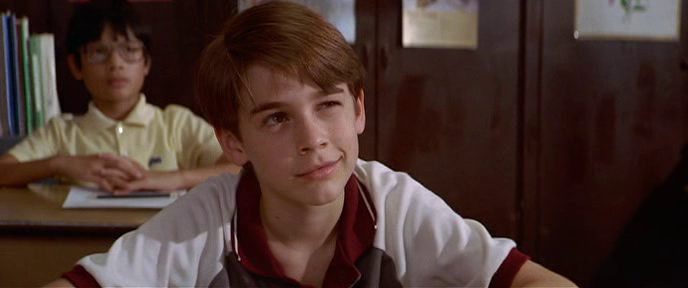
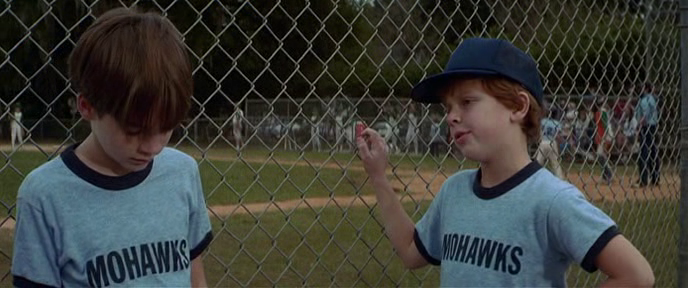
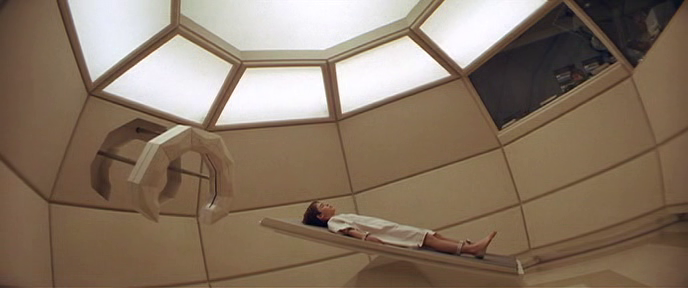
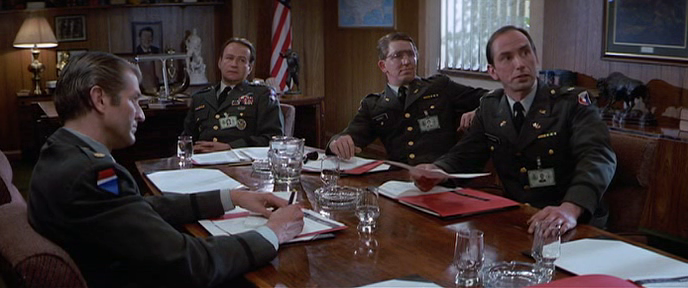
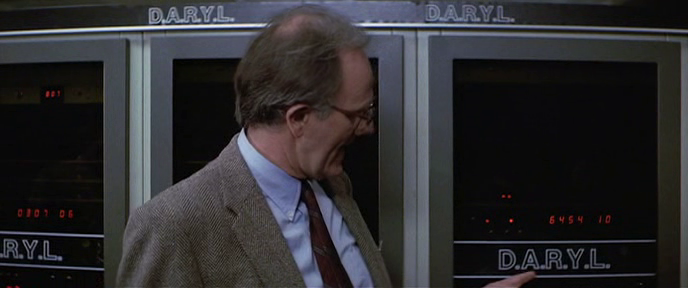
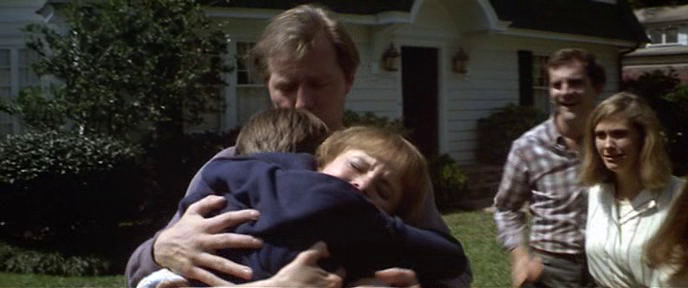
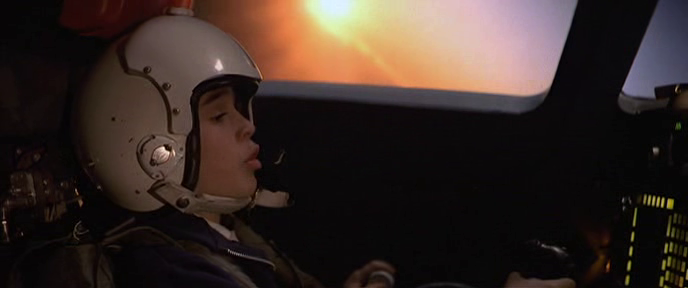

No comments:
Post a Comment